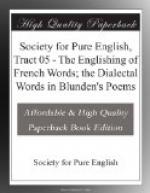and though our poet’s glossary tells us that dor = dor-hawk or nightjar, it really is not so. A dor is a beetle so called from its making a dorring noise, and the name, like churr and burr, is better with its double R and trill. Dor-hawk may be a name for the nightjar, but properly dorr is not; and if it were, it would be forbidden by daw so long as it neglected its trill. Note also the misfortune that four lines below we read
‘The pigeons flaunted round his door’,
where the full correct pronunciation of door (d[open o][schwa]) will not quite protect it. The whole line quoted from p. 7 is obscure, because a nightjar would never be recognized by the description of a bird that utters a crackling cry when flying. That it then makes a sound different from its distinctive whirring note is recorded. T.A. Coward writes ’when on the wing it has a soft call co-ic, and a sharper and repeated alarm quik, quik, quik.’ It is doubtful whether crackling can be accepted.
4. ‘The grumping miller picked his way’. (8)
#Grumping# is a good word, which appears from the dictionaries to be a common-speech term that is picking its way into literature.
5. ‘The golden nobs and pippens swell’. (12)
#nob# is knob. Golden-nob is ‘a variety of apple’; see E.D.D.: and as a special name, which the passage implies, it should be hyphened.
6. ’where the pollards frown, Notched, dumb, surly images of pain’. (13)
#Notched.# This word well describes the appearance of old pollard willows after they have been cropped; but its full propriety may escape notice. A very early use of the verb to notch was to cut or crop the hair roughly, and notched was so used. The Oxford Dictionary quotes Lamb, ‘a notched and cropt scrivener’. Then pollard itself is from poll, and means an animal that has lost its horns as well as a tree that has been ‘pollarded’.
7. ‘In elver-peopled crevices’. (19)
We are grateful for #elver#. This form has carefully differentiated itself from eel-fare, which means the passage of the young eels up the rivers, and has come to mean the eel-fry themselves.
8. ‘For Sussex cries from primrose lags and breaks’. (22)
E.D.D., among many meanings of #lag#, explains this as a Sussex and Somerset term for ’a long marshy meadow usually by the side of a stream’. Since the word seems as if it might be used for anything somewhere, we cannot question its title to these meadows, but we doubt its power to retain possession, except in some favoured locality.
9. ‘And chancing lights on willowy waterbreaks’. (22)
We have to guess what a waterbreak is, having found no other example of the word.




